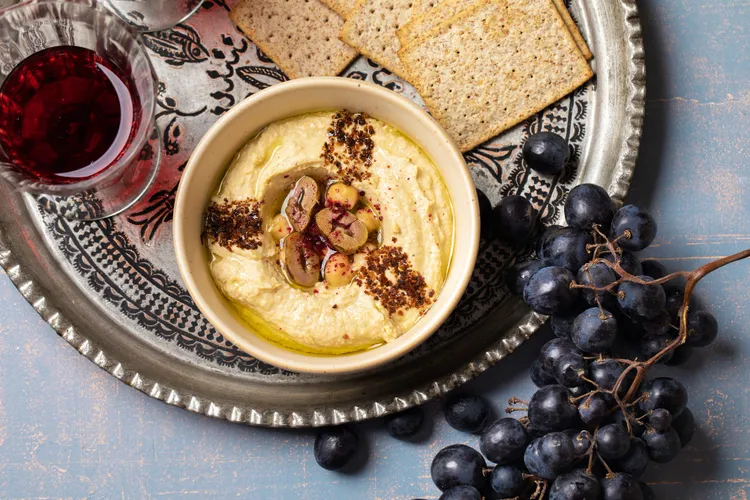Eat Like You Respect Yourself: A Guide to Nourishing Your Body and Mind with Intention
The phrase “eat like you respect yourself” is more than a catchy slogan - it’s a call to approach food with mindfulness, intention, and self-care. In a world filled with fast food, fad diets, and endless nutritional noise, eating in a way that honors your body means choosing foods that fuel your physical health, support your mental well-being, and align with your values. It’s about treating yourself with kindness, not deprivation, and recognizing that food is not just sustenance but a powerful tool for living a vibrant, balanced life.

What Does It Mean to Eat Like You Respect Yourself?
Eating with self-respect means making food choices that prioritize your long-term health, energy, and happiness over fleeting cravings or convenience. It’s about:
- Nourishing Your Body: Choosing nutrient-dense foods that provide energy, support immunity, and prevent disease.
- Listening to Your Body: Honoring hunger and fullness cues rather than eating out of habit, stress, or boredom.
- Aligning with Your Values: Selecting foods that reflect your ethical beliefs, whether that’s sustainability, animal welfare, or cultural traditions.
- Balancing Enjoyment and Health: Finding joy in food without guilt, while avoiding choices that leave you feeling sluggish or unwell.
- Rejecting Diet Culture: Moving away from restrictive diets or quick fixes in favor of sustainable, personalized eating habits.
This approach is rooted in self-care, not perfection. It’s about making choices that make you feel good inside and out, while fostering a positive relationship with food. Let’s dive into the 10 principles of eating like you respect yourself, complete with science-backed insights and practical tips to make it part of your daily life.
10 Principles to Eat Like You Respect Yourself
These principles combine nutrition science, mindfulness, and practical strategies to help you nourish your body and mind with intention.
- Prioritize Whole, Nutrient-Dense Foods
- Why It Matters: Whole foods - like vegetables, fruits, whole grains, lean proteins, and healthy fats - are packed with vitamins, minerals, fiber, and antioxidants that support every bodily function, from energy production to immune health. Processed foods, high in sugar and unhealthy fats, often leave you sluggish and nutrient-deficient.
- Science Says: A 2021 study in Nature Food found that diets rich in whole foods reduced the risk of chronic diseases like heart disease and type 2 diabetes by up to 30%.
- How to Do It:
- Aim for 5-7 servings of fruits and vegetables daily (e.g., a spinach salad, berries as a snack).
- Choose whole grains like quinoa, brown rice, or oats over refined grains like white bread.
- Include lean proteins (chicken, fish, tofu) and healthy fats (avocado, nuts) in most meals.
- Pro Tip: Fill half your plate with colorful veggies, a quarter with protein, and a quarter with whole grains or starchy veggies for balanced nutrition.
- Listen to Your Hunger and Fullness Cues
- Why It Matters: Eating when you’re truly hungry and stopping when you’re comfortably full respects your body’s natural signals. Ignoring these cues - by overeating or undereating - can disrupt digestion, energy, and mental clarity.
- Science Says: A 2018 study in Obesity Reviews found that mindful eating, including honoring hunger and fullness, reduced overeating and improved weight management.
- How to Do It:
- Rate your hunger on a scale of 1-10 before eating (1 = starving, 10 = stuffed). Aim to eat when you’re at 3-4 and stop at 6-7.
- Eat slowly, chewing each bite 20-30 times, to give your brain time to register fullness (about 20 minutes).
- Avoid distractions like TV or phones during meals to stay tuned into your body’s signals.
- Pro Tip: Pause halfway through your meal to check in with your hunger and fullness levels.
- Choose Foods That Energize, Not Drain
- Why It Matters: Foods high in refined sugars or unhealthy fats (e.g., soda, fried snacks) cause blood sugar spikes and crashes, leaving you tired and irritable. Nutrient-dense foods provide steady energy and support mental focus.
- Science Says: A 2017 study in The American Journal of Clinical Nutrition showed that low-glycemic-index foods (like oats and legumes) sustained energy and reduced fatigue compared to high-glycemic foods.
- How to Do It:
- Swap sugary snacks for whole foods like apples with almond butter or Greek yogurt with berries.
- Include protein and fiber at every meal to stabilize blood sugar (e.g., eggs with whole-grain toast and spinach).
- Limit processed carbs (white bread, pastries) that spike blood sugar.
- Pro Tip: Keep a stash of portable, energizing snacks like nuts or hard-boiled eggs for busy days.
- Hydrate Like It’s Your Job
- Why It Matters: Water is essential for digestion, nutrient absorption, and energy. Dehydration can mimic hunger, reduce focus, and cause fatigue, undermining your self-respectful eating efforts.
- Science Says: A 2016 study in Frontiers in Nutrition found that even mild dehydration (1-2% body weight loss) impaired cognitive performance and mood.
- How to Do It:
- Drink 16-20 oz of water first thing in the morning to rehydrate after sleep.
- Aim for 2-3 liters of water daily (more if active), sipping throughout the day.
- Add flavor with cucumber, lemon, or mint to make hydration enjoyable.
- Pro Tip: Carry a reusable water bottle and set reminders to drink every hour.
- Embrace Protein as Your Satiety Superstar
- Why It Matters: Protein is the most satiating macronutrient, reducing hunger hormones (ghrelin) and increasing fullness hormones (peptide YY). It also supports muscle repair and overall health.
- Science Says: A 2015 study in The American Journal of Clinical Nutrition found that diets with 25-30% protein increased satiety and reduced snacking compared to lower-protein diets.
- How to Do It:
- Include 20-30 g of protein per meal (e.g., 3 oz chicken, 1 cup lentils, or 2 eggs).
- Snack on protein-rich foods like Greek yogurt, edamame, or cottage cheese.
- Vary sources: animal (fish, eggs) and plant-based (tofu, chickpeas) for diversity.
- Pro Tip: Spread protein intake evenly across meals to optimize muscle synthesis and satiety.
- Make Peace with Healthy Fats
- Why It Matters: Healthy fats (monounsaturated and omega-3s) slow digestion, promote fullness, and support hormone production and brain health. Restricting fats out of fear of calories can lead to hunger and nutrient deficiencies.
- Science Says: A 2013 study in Nutrition Journal found that adding avocado to meals increased satiety and reduced hunger for up to 5 hours.
- How to Do It:
- Include healthy fats in every meal: ¼ avocado, 1 tbsp olive oil, or a handful of nuts.
- Choose fatty fish (salmon, mackerel) twice weekly for omega-3s.
- Avoid trans fats (in fried foods, margarine) that increase inflammation.
- Pro Tip: Drizzle olive oil on salads or veggies for flavor and satiety without overdoing it.
- Limit Added Sugars and Ultra-Processed Foods
- Why It Matters: Added sugars and ultra-processed foods (e.g., chips, soda, candy) cause rapid blood sugar spikes, leading to cravings, energy crashes, and inflammation. Choosing whole foods respects your body’s long-term health.
- Science Says: A 2019 study in The BMJ linked high consumption of ultra-processed foods to a 62% increased risk of mortality and chronic diseases.
- How to Do It:
- Check labels and aim for <10 g of added sugar per serving.
- Swap processed snacks for whole foods: fruit instead of candy, nuts instead of chips.
- Cook at home to control ingredients and avoid hidden sugars.
- Pro Tip: Satisfy sweet cravings with naturally sweet foods like dates or baked apples with cinnamon.
- Eat with Intention and Joy
- Why It Matters: Eating mindfully - savoring flavors, textures, and the experience of food - enhances satisfaction, reduces overeating, and fosters a positive relationship with food. Food should be a source of joy, not guilt.
- Science Says: A 2018 study in Appetite found that mindful eating practices reduced emotional eating and improved dietary quality.
- How to Do It:
- Eat at a table, free from distractions like phones or TV.
- Take time to appreciate the colors, smells, and flavors of your meal.
- Allow yourself to enjoy treats (e.g., dark chocolate) in moderation without guilt.
- Pro Tip: Practice gratitude before meals by reflecting on where your food came from or who prepared.
- Align Your Diet with Your Values
- Why It Matters: Eating in a way that reflects your ethical beliefs - whether it’s sustainability, animal welfare, or cultural traditions - creates a sense of purpose and self-respect. It connects your food choices to your identity and values.
- Science Says: A 2020 study in Sustainability found that value-aligned diets (e.g., plant-based for environmental reasons) improved adherence and mental well-being.
- How to Do It:
- Choose locally sourced, seasonal produce to support sustainability.
- Opt for ethically raised meats or plant-based proteins if animal welfare matters to you.
- Incorporate cultural or family recipes that feel meaningful.
- Pro Tip: Research brands or farms that align with your values (e.g., organic, fair-trade) to make informed choices.
- Plan and Prep for Success
- Why It Matters: Planning meals and keeping healthy options accessible reduces reliance on fast food or unhealthy choices when you’re busy or stressed. Preparation is an act of self-respect, ensuring you’re set up for success.
- Science Says: A 2017 study in The International Journal of Behavioral Nutrition found that meal planning was associated with healthier eating patterns and lower obesity risk.
- How to Do It:
- Plan 3-5 meals per week, including protein, veggies, and whole grains.
- Prep ingredients in advance (e.g., chop veggies, cook grains) to save time.
- Keep healthy snacks (nuts, fruit, yogurt) on hand for busy moments.
- Pro Tip: Batch-cook one or two dishes (e.g., a quinoa salad or lentil soup) on weekends to have ready-to-eat meals during the week.
Additional Tips to Eat Like You Respect Yourself
- Practice Balance, Not Deprivation: Allow room for treats (e.g., a slice of cake at a celebration) without guilt, but prioritize nutrient-dense foods most of the time.
- Learn Your Body’s Needs: Pay attention to how foods make you feel. If dairy causes bloating or caffeine makes you jittery, adjust accordingly.
- Stay Hydrated: Drink water throughout the day to support digestion and prevent mistaking thirst for hunger.
- Get Support if Needed: Work with a registered dietitian to create a personalized eating plan, especially if you have medical conditions or dietary restrictions.
- Celebrate Small Wins: Acknowledge progress, like choosing a salad over fries or eating mindfully, to build confidence and consistency.
Common Questions About Eating with Self-Respect
Q: How do I avoid feeling deprived when cutting out processed foods? A: Focus on adding delicious, nutrient-dense foods rather than restricting. Experiment with flavorful recipes (e.g., roasted veggies with herbs) and allow occasional treats to maintain balance.
Q: What if I don’t have time to cook healthy meals? A: Prep simple meals in advance (e.g., overnight oats, chopped veggies) and keep healthy snacks like nuts or fruit on hand. Batch-cooking saves time during the week.
Q: Can I still eat my favorite comfort foods? A: Yes! Make healthier versions (e.g., baked sweet potato fries instead of fried) and enjoy comfort foods in moderation as part of a balanced diet.
Eating like you respect yourself is about making food choices that honor your body, mind, and values. By prioritizing whole foods, listening to your hunger cues, embracing healthy fats, and aligning your diet with your principles, you can nourish yourself in a way that feels empowering and sustainable. These 10 principles aren’t about perfection - they’re about progress, intention, and self-care. Start small, experiment with what feels good, and watch how eating with respect transforms your energy, mood, and overall health. You deserve to feel your best, and it starts with every bite.









